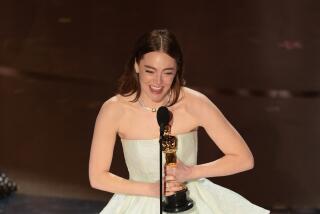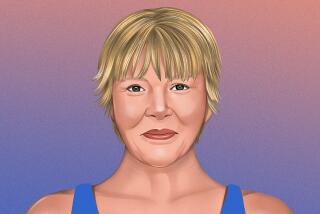Oscars 2014: Blanchett, Nyong’o wins show female resilience is victor
Cate Blanchett was grateful and defiant in picking up the lead actress Oscar for her devastating performance in “Blue Jasmine,” suggesting those who dismiss a film with a female star as “niche” are the cliche. Lupita Nyong’o’s gracious words on her supporting actress win for “12 Years a Slave,” spoke of a love of the art, of its power to heal great divides.
Both portrayals gave us painful windows into a woman’s world. As incredible as they were, for a change they were not alone. This year the actresses — winners and nominees — created characters as richly varied as they were deeply provocative. The sheer range of personas and pathos in their work rivaled anything conjured up for their male counterparts’.
One line of dialogue from a best picture contender stays with me: “She’d come from a place where her options were limited.”
FULL COVERAGE: Oscars 2014 | Complete list of winners
Simple, pointed, it falls early on in David O. Russell’s “American Hustle.” Christian Bale’s con artist is describing his lovely moll Sydney, played by Amy Adams. He could just as easily be referring to any of the women in the running for an acting Oscar, starting with “Hustle’s” Jennifer Lawrence as Rosalyn, the Long Island single mother he’d married and betrayed years earlier.
A ‘50s-era, young single mother in Ireland, deemed a social outcast, institutionalized and robbed of her child, Philomena Lee’s options were nearly nil. The powerful film of her story, with Judi Dench as the older Lee trying to right the past, uncovered a lot of dirty laundry.
We also saw Sally Hawkins’ ground-down, 21st-century divorced mother in “Blue Jasmine.” Julia Roberts’ angry midlife wife and daughter in “August: Osage County.” Meryl Streep and Blanchett portrayed very different shades of wounded, self-medicated and vengeful women in “August” and “Blue Jasmine,” respectively. June Squibb’s acerbic heartland wife in “Nebraska” boils years of disappointments into a searing comic screed. And Nyong’o as Patsey, a slave owned by a sadist in “12 Years,” stands in stark relief for the women who have no options at all.
PHOTOS: Red carpet arrivals | Show highlights
Sandra Bullock’s space engineer in “Gravity” is the only one among the 10 contenders for whom the future is limitless — until fate and the universe intervene.
One in 10 — slightly better statistical odds than a woman directing one of the top 250 films, which stood at 9% in 2012, the last time professor Martha Lauzen, who tracks these gender shifts, tested the waters.
What is significant is not only where the characters began but where the stories took them.
In every case, the roles were weighty, the milieu they existed in complex. The issues were explosive and filmmakers pushed them into emotional minefields. The battles were sometimes interior ones, as with the deceiving froth of “American Hustle,” which has more pith than one might sense on first watching. At other times it came as a full frontal assault of angst, which we saw in “August: Osage County” and “Nebraska.” And there was the wrenching death spiral of Patsey in “12 Years” and Jasmine in “Blue.”
Rarely did stereotypes come to mind. No one here was reduced to clichés.
Instead moviegoers saw a vast cross-section of the ways women cope with convention — past, present and future. Everywhere resilience could be found, intelligence was on display, vulnerabilities were exposed as they dealt with cultural, social, psychological constrictions.
PHOTOS: Winners’ room | Behind the scenes | Quotes from the stars
Lawrence’s Rosalyn put the challenge for this Oscar season’s women in earthy and explicit terms during the film’s caustic catfight. “Sometimes all you have in life are ... poisonous choices,” she howls before planting a Judas-kiss on Sydney.
The poisonous choices of the ‘70s became a modern, upwardly mobile reality in “Blue Jasmine.” Blanchett’s trophy wife, painstakingly sculpted to meet societal expectations, is the crucible for everyone’s disillusionment — especially her own.
Whatever their decision, the choice to a person, cut both ways. In one of Streep’s final salvos in “August,” adapted by Tracy Letts from his Pulitzer-winning play, voice raised along with a fist, she says to the living and the dead: “Nobody’s stronger than me…. When nothing is left, when everything is gone and disappeared, I’ll be here.”
Though the Oscars left the building with Blanchett and Nyong’o, for all of this year’s actress nominees I say: They are woman — hear them roar.
More to Read
Only good movies
Get the Indie Focus newsletter, Mark Olsen's weekly guide to the world of cinema.
You may occasionally receive promotional content from the Los Angeles Times.







